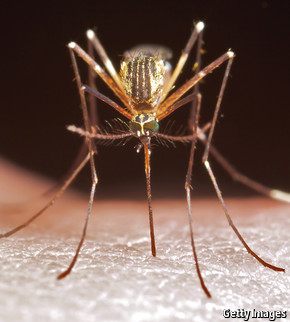A new vaccine will help, but will not defeat malaria

ON OCTOBER 8th researchers announced progress in developing a vaccine against malaria. GlaxoSmithKline (GSK), a British pharmaceutical firm, said it would seek regulatory approval next year for this vaccine, called RTS,S. GSK and its charitable partner, the PATH Malaria Vaccine Initiative, also revealed new data showing the vaccine’s effect in children. This is good news, but RTS,S will not vanquish malaria by itself.
There were, according to the World Health Organisation (WHO), about 200m cases of malaria around the world in 2010, with 660,000 deaths, 90% of which were in Africa, mostly of young children. The prospect of a vaccine is therefore exciting to patients and health experts alike. But developing one is difficult. Malarial parasites, though small and single-celled, are much more complex than the bacteria and viruses that are the usual targets of vaccines. To date there has been no successful vaccine against such a complex organism. Work on RTS,S has been going on for decades.
A clinical trial at 11 sites in seven African countries shows RTS,S does indeed protect against malaria. But it does not work as well as researchers had hoped. The recent data show the effect 18 months after vaccination. In children (aged five to 17 months when vaccinated) it reduced the number of cases by 46%. In infants (aged six to 12 weeks) it reduced them by 27%. And its effect seems to wane. Earlier results showed efficacies after one year of 56% in children and 31% in infants.A case of malaria starts when a mosquito’s bite delivers parasites into a person’s bloodstream. These travel to the liver, where they hide, mature, multiply and eventually emerge back into the bloodstream to invade and destroy its red cells. The vaccine contains a protein found on the surface of the parasite, combined with an antigen for hepatitis B that prompts an immune response, plus an added immune-system booster. RTS,S seems to provoke antibodies and killer cells that attack the parasite before it leaves the liver.
These figures compare with the aspiration, set by a consortium of malaria experts in 2006, to have by 2015 a vaccine that was more than 50% protective. RTS,S has not reached that desideratum, but its effects are not negligible. The big questions, then, are whether RTS,S is effective enough to win approval from the European Medicines Agency, whether the WHO will recommend its use, and whether donors will pay for it.











No comments:
Post a Comment